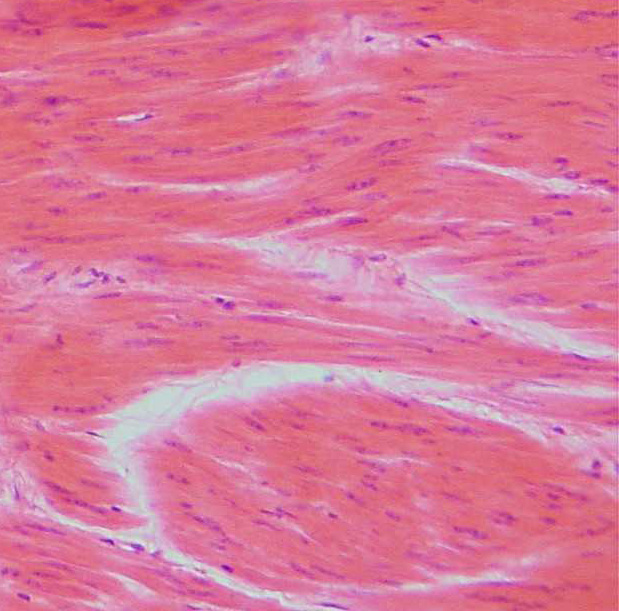10/01/2018
Print PageGenetic defect makes malignant smooth muscle tumors vulnerable
Leiomyosarcoma is a type of cancer of the smooth muscles that can arise almost anywhere in the body. Common places are the uterus, the abdomen or the muscles of the blood vessels. Even the tiny muscles that make our hair stand on end can be affected.
Like most other types of sarcoma, leiomyosarcomas respond very poorly to chemotherapy. In many cases, surgery and radiotherapy are the only effective treatment options. "Unfortunately, many tumors recur despite radical surgery or have already spread in the body," said Stefan Fröhling, an oncologist who works at the German Cancer Research Center (Deutsches Krebsforschungszentrum, DKFZ), the National Center for Tumor Diseases (NCT) Heidelberg and Heidelberg University Hospital.
Leiomyosarcoma is a very rare type of cancer. Only about 150 to 200 cases are diagnosed each year in Germany. Therefore, little is known to date about its molecular causes. In collaboration with other partner sites of the German Cancer Consortium (DKTK) as well as partners in Mannheim and Rotterdam, Fröhling and his colleagues have now been the first to study the genetic causes of leiomyosarcoma in a comprehensive analysis of tumor samples from 49 patients. The researchers sequenced the tumor genomes and analyzed the genes that showed particular activity. "An analysis of this kind would not have been possible at a single hospital," Fröhling said. "One of our goals was to find specific alterations that can be used to attack the cancer cells using targeted drugs."
The researchers found a state of complete chaos in the genome of leiomyosarcoma. In many cases, large parts of the genome were missing or were present in multiple copies. In some cases, the whole genome had doubled or even tripled. In particular, the investigators noticed that the two most important cancer brakes, tumor suppressor genes TP53 and RB1, were absent in extremely many cases. In over 90 percent of the samples under investigation, both of their gene copies had been destroyed.
The analysis also revealed how the tumor cells acquire immortality. In over 75 percent of the cases studied, the cancer cells had found different ways of lengthening their telomeres. In healthy cells, the length of these structures on the ends of chromosomes limits the number of possible divisions.
The scientists also made an encouraging discovery: In most tumors, they found evidence suggesting that an important DNA repair system known as homologous recombination had been disrupted. As a result, the cancer cells become sensitive to substances that destroy DNA such as certain chemotherapy agents. Another tactic for cancer cells with this type of mutation is to use substances called PARP inhibitors to disable also the other key cellular DNA repair system. "Then the cancer cells die from their genomic defects," explained Claudia Scholl from DKFZ, who led the investigation jointly with Fröhling.
The researchers have already been able to confirm this theory in leiomyosarcoma cells in the Petri dish. "First clinical trials will examine whether this approach is effective in bone sarcoma," Scholl said. "We have found a starting point which we might be able to use to better help people with leiomyosarcoma in the future," the scientist said.
Original Publication:
Priya Chudasama, Sadaf S. Mughal, Mathijs A. Sanders, Daniel Hübschmann, Inn Chung, Katharina I. Deeg, Siao-Han Wong, Sophie Rabe, Mario Hlevnjak, Marc Zapatka, Aurélie Ernst, Kortine Kleinheinz, Matthias Schlesner, Lina Sieverling, Barbara Klink, Evelin Schröck, Remco M. Hoogenboezem, Bernd Kasper, Christoph E. Heilig, Gerlinde, Egerer, Stephan Wolf, Christof von Kalle, Roland Eils, Albrecht Stenzinger, Wilko Weichert, Hanno Glimm, Stefan Gröschel, Hans-Georg Kopp, Georg Omlor, Burkhard Lehner, Sebastian Bauer, Simon Schimmack, Alexis Ulrich, Gunhild Mechtersheimer, Karsten Rippe, Benedikt Brors, Barbara Hutter, Marcus Renner, Peter Hohenberger, Claudia Scholl & Stefan Fröhling: Integrative genomic and transcriptomic analysis of leiomyosarcoma
Nature Communications 2018, DOI: 10.1038/s41467-017-02602-0
